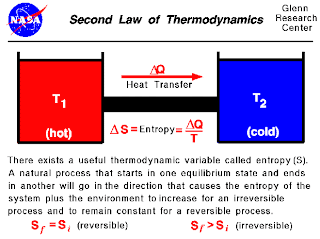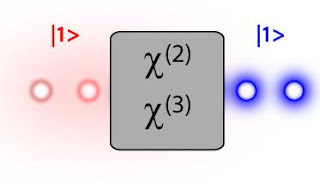Sparky trembled as he sat in the car and watched the huge alien monster, Skyron hanging against the side of PPG tower. It's long scythe forelimbs and eight spidery legs supporting it's scorpion like body. It had just finished planting several of it's eggs into the interior of the building. Now it seemed to be content with just hanging against the side of the building while a small army of the Pittsburgh police were shooting at it. The sounds of multiple gunfire were loud enough to drown out Sparky's own thoughts. Three officers were standing directly in front of the car while shooting at the monster. So far their combined firepower was proving to be ineffective against it. Looking at the far left and right sides of Market Square Sparky saw a few people cowering down to the ground close to the storefronts. In the car Sid and Jake were both stooping down in fear while peering up over the dashboard to take a look out of the windshield.
Guys! This thing destroys planets! Sparky thought while barking three times. I don't think that a few bullets are going to get it's attention.
One of the officers turned and faced the car. He stormed over to the driver's side window. "Hey! You kids get the hell out of here! It's too dangerous!" He shouted.
It was too dangerous when we were back in McKeesport, thought Sparky. Now here we are in Downtown Pittsburgh. It hasn’t gotten any better.
"Get out of here and head back up Fifth Avenue,” the officer ordered. “There's a roadblock set up past Macy's. Get past the road block and you'll be safe."
Sid and Jack both nodded.
The officer went back to continue shooting at Skyron.
Sid opened his driver's side door.
"What are we going to do? Leave the car?" asked Jake.
"The car is toast," Sid cried out. "And so are we if we don't get out of here."
Keeping their heads down Sid and Jake both got out of the car. Jake's arms held Sparky in a tight grip. As they were running from the car Sparky heard the loud rumble in the sky. He looked up to see two jet planes streaking through the sair high above his head. The planes both launched missiles that flew on a direct course to hit Skyron. Both missiles exploded against Skyron's hide. Sparky whined in fear at the sight of the fireballs that the missiles produced. Along with the thunderous booms of the explosions filling his ears. Skyron let out a roar and then dropped down from the building. It appeared to be unhurt by the missiles as it stomped forward to attack the officers. Sparky saw the frightened faces of the people cowering near the storefronts at the far left and right of the square.
Sid and Jake both dashed across market square and entered a short alley that led them to Fifth avenue. There were several other people on the street all running to reach the same destination. The road block set up further down the street. There was a police officer walking down the street while holding a flashlight. He waved both arms forward as he spurred the people on.
"Let's move it people. Move it! Keep going up the street!" the officer shouted.
Sparky, being carried by Jake, took a look back to see Skyron smashing down the surrounding buildings in the alley to snatch up several unfortunate victims in it's tentacles. Two more jets came streaking overhead. Launching missiles at the monster that exploded against it but causing no harm. Still trembling, Sparky turned his head away, only hearing the sound of Skyron's roar. Then he heard Sid's frantic voice.
"It's not following us! It's going back into Market Square!"
"Who cares? Keep running!" Jake quickly cried back.
Daring to look back Sparky caught a glimpse of Skyron's long thrashing tail as the monster went back into the square. It's not following us. Thank God, thought Sparky. Then he surmised the motivation behind Skyron's actions. It's staying close by to watch it's eggs. Makes sense.
Skyron's eggs. Sparky recalled the image of the eggs. All of the large green globes pulsating and growing. He did not know how long it would take them to hatch. But he knew that when that happened there would be more monsters like Skyron walking the Earth. And with that dire thought in his mind Sparky wondered if running back home to McKeeport or remaining here in the city would make any difference.
Those eggs. if they all hatch then we're toast, Sparky's conclusion. Somebody has to do something. Sparky began to wish that there was something he could do to stop these monsters are save the city. And perhaps save the world. But he began to face the limitations of being a little dog. He was helpless on his own. But he still had an idea. The other thing. The thing that fell into the river when Skyron came. Maybe that's the answer.
Still running, Jake and Sid passed by Macy's department store at their right and reached the roadblock that was set up by the police. Two patrol cars with their bar light flashing blocked the street. Two officers with flashlights waved everyone through.
"Keep moving. The area is being evacuated," said one of the officers.
Sid and Jake continued running up the street with the other people. They traveled half a block before stopping.
Sid leaned over, panting loudly for air, as did Jake.
"We're safe," Sid exclaimed. He took in a huge gulp of air.
Sparky disagreed. No. We're not safe. You didn't see? The thing laid eggs in the building. We're going to have an army of those monsters following us home.
Catching his breath, Jake Stood up. "What the hell are we going to do now?" we've got no car to get home?"
"What do you think? Call dad to come get us with his pickup," was Sid's answer.
Jake took out his cell phone and pressed the number to call home.
While Jake was talking to his father Sparky looked down the street towards downtown. There was the roaring sound of more jets flying overhead. And the sound of several more explosions. A few people began to gather in the area. Sparky over heard some of the comments that they were making about the situation in the city.
"Where the hell did that thing come from?" a young black female asked.
"It came out of the river," said one man. "I saw it. I heard something about aliens. This is crazy.'
"One of the cops said that the air force is trying to deal with this thing," said another man. "And they're calling out the national guard too."
The air force and national guard. Will they be able to help? Sparky wondered.
Jake ended his phone conversation. "Dad said that he's on his way. He'll pick us up in front of Lousy Louie's car dealership further up Fifth Avenue.
"Ok. Good," Sid told him. "Let's hope that freak stays put while we're waiting for him."
Sid and Jake traveled further up the street until they came to the small car dealer ship at the right side of the street. It's small fleet of cars were in a lot enclosed by a twelve foot high chain link fence. Attached to the fence was a large white sign displaying the words in bold black letters, Lousy Louie's Used Cars. Jake was still carrying Sparky in his arms as he and Sid waited in front of the car lot for an hour. Then driving down the street at their right cam the welcome sight of their father's blue Ford pickup truck. Jake and Sid both cheered when they saw the truck pulling up at the right side of the road and honking it's horn. They wasted no time running towards the vehicle. But Sparky was not as elated as the two youths. He knew that there was no running from the terror as long as Skyron and it's offspring were still alive. And he had serious doubts that any force on this planet was powerful enough to stop them.
Sparky remained tense during the ride home. Sid and Jake's father, Ed. a bald middle aged black man dressed in his blue jeans and green shirt, said little during the drive. Sid was sitting next to Ed. While Jake, holding Sparky in his arms sat at his right with the strong breeze of cool air rushing through the open passenger's side window. At the start Ed gave Sid and Jake a harsh scolding for coming to the city to chase down this monster. It was a foolish act on their part. Then he relayed the news that the military was marshaling a stronger force against the monster. But so far all efforts to destroy it were ineffective. There was no mention of the monster's eggs. Apparently that was an impending threat that only Sparky was aware of. With this bearing on his mind Sparky knew that he would get very little sleep tonight.
After an hour's drive the truck finally reached the streets of McKeesport. Even though he was back in his home territory Sparky felt little relief. He remembered the destruction that Skyron brought to this city and to Pittsburgh. Looking out through the open window at the many houses and buildings they passed by Sparky imagined that all this could be destroyed when Skyron returned with it’s offspring. He was imagining the streets littered with the fleshless bones of countless victims. Among these bones could very well lay the skeleton of a Chihuahua.
A familiar sight came to Sparky's eyes. The Monongahela river and the bridge spanning over it. We'll be home soon, Sparky thought. Then he looked to the dark rushing waters below as the truck began to cross the bridge. The thing. The other thing in the river. It has to be still here.
Sparky's mind reached out and again touched the powerful consciousness of what ever was resting at the bottom of the Monongahela. It's still there.
Sparky knew that what ever the thing was it might be the only hope of saving the Earth. Sparky had to reach it. A daring plan came to his mind. He looked out of the open passenger's side window. This is going to hurt. Sparky held his breath and then squirmed out of jakes arms so that he could leap out of the window. Sparky's body hit the hard pavement and rolled for several pain filled feet. Through his pain Sparky's vision turned black. His mind focused on the sound of cars rushing past him. And Jake's loud frantic voice.
"Sparky! What the hell?"
Sparky opened his eyes and struggled to stand up. His body was still aching. Holy hell. That always looks easier when they do it on TV. I'll never do that again.
Sparky began to walk. Even though his head and back were still throbbing with pain he was grateful that he had no broken bones. His ears sprang up when he heard Jake's voice calling out again.
"Sparky! What the hell's the matter with you? Get back here!"
Sparky looked back at Jake. Sorry pal. I have to try and save the world. I hope.
Sparky dashed across the street to avoid an oncoming car. He reached the sidewalk and crossed the bridge. Several yards away he could see the spot where Jake, and Sid were fishing earlier tonight. This was the place where this nightmare began. With his mission in mind, Sparky ran across the bridge to reach the area below. Sparky reached the spot near the edge of the river. Jake and Sid's fishing rods were still laying on the ground. With caution Sparky stepped closer to the river and gazed into the dark flowing water. His mind felt the alien consciousness at the bottom of the river. He sensed that it was asleep. But even in it's dormant state Sparky could still feel it's power. Fearsome and overwhelming.
I can feel you down there, Sparky thought. I have to get you up. What ever you are we need you. Sparky's mind tried to reach deeper into the sleeping alien consciousness. He barked at the water four times.
Out in the middle of the river a huge swarm of bubbles exploded up from beneath the water. Then a tower of water rose up into the air, accompanied by a gigantic shape. When the water rained back down into the river Sparky received a clear view of the thing that rose out of the river. It was an enormous creature with a body covered by large, silvery overlapping spines. It climbed out of the river on it's muscular, reverse jointed hind legs. Also covered by the overlapping spines. It used it's two muscular front legs to steady itself. It's huge three fingered hands with their long talons digging into the wet soil of the river bank. The creature's long serpentine tail, covered with long sharp spines created huge splashes as it thrashed back and forth in the water. On the creature's back two huge silvery wings unfolded. The edges of it's wings were serrated like saw blades. The most striking feature that caught Sparky's attention was the creature's head. It had canine-like features. The head of a german shepard came to Sparky's mind. Only covered by silver spines instead of fur. And two long horns protruding from the top of it's head, just above it's two blazing red eyes. At the sides of it's head it's long ears with their serrated edges and coat of spines stood up like a smaller pair of wings. The creature opened it's mouth, exposing its long sharp teeth, and let out a loud, deep toned roar that rattled Sparky's bones. Sparky stood trembling as he looked up at the gigantic monster. The creature, by his estimate, was as large as a five story building. The same as size as Skyron. Sparky had just awakened Xzytovhorre. The architect of destruction. Xzytovhorre was now also very angry.
Xzytovhorre looked to the left and right. It's tail thrashed the water. It let out another fearsome roar.
Sparky's eyes bulged as he gazed up at the angry giant monster. Ok. Maybe this wasn't really a good idea.
Through his fear Sparky's mind was still able to reach out and touch the mind of this monster. Several thoughts flashed through Sparky's mind. Xzytovhorre, Skyron, Enemies. Criminals. Death. Destruction. The planet Floria destroyed. Prison.
Sparky broke off contact with Xzytovhorre's mind. Criminals? Prison? Holy crap! Did I just wake up an escaped alien criminal? This was definitely a really bad idea.
Xzytovhorre moved closer onto the river bank and let out another roar. It slammed it's huge three fingered fist down onto the ground, creating a boom that was as loud as thunder. The impact of it's striking fist created a force that lifted Sparky up off the ground for a few feet. Sparky dropped back to the ground, then looked up at the monster in fear of what it would do next.
Take it easy pal. Sorry I woke you. Why don’t you just go back to sleep and we’ll both pretend that I was never here.
Xzytovhorre looked down at Sparky. It opened it's mouth and bit down.
TO BE CONTINUED.
(Is this the end of Sparky? Is the Earth doomed now that two alien monsters are on the loose? Find out in the conclusion to our story. Xzytovhorre. Part 4. Xzytovhorre VS Skyron.)






